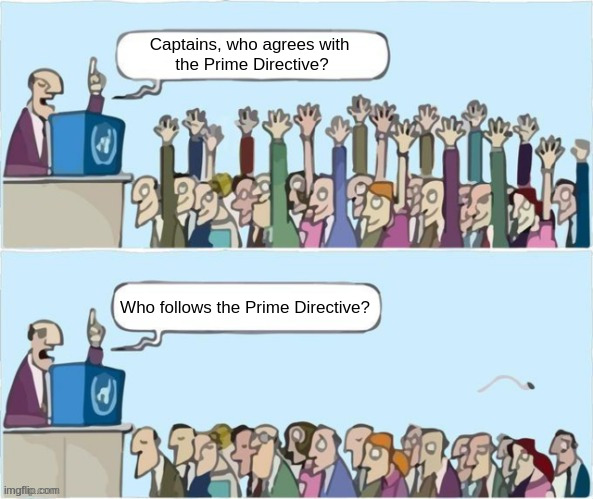




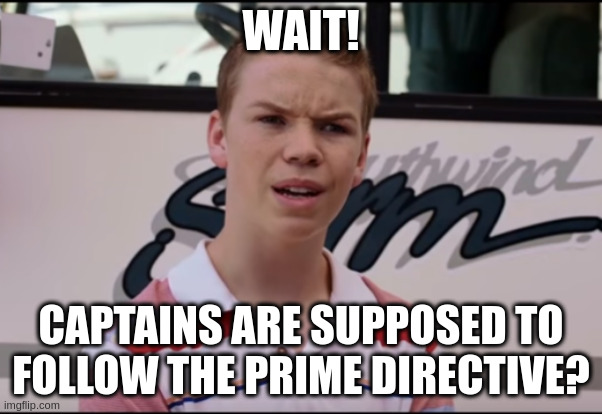
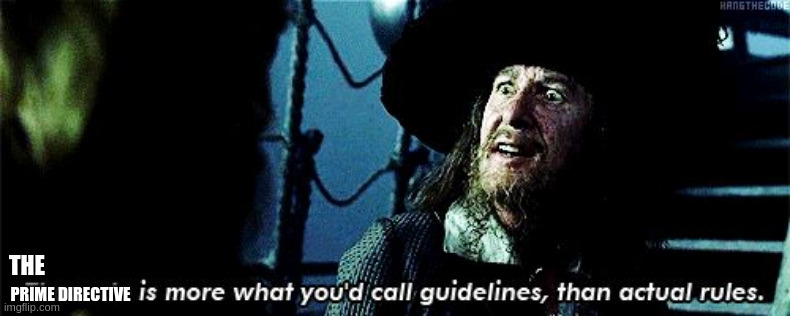
It’s an old meme, sir, but it checks out.
Wesley: Sentenced to death for violating law on foreign planet.
Picard: “We cannot violate the prime directive.”
Beverly: “You’re not seriously going to let them kill my son…”
Picard: “To hell with the prime directive.”
I wonder if this is the original source of the Shut Up Wesley memes (probably not but at least the backdrop / context maybe)?

Heehee I haven’t seen this one before, I could see it dozens, hundreds of times.
An infinite variety of combinations!


Especially when he fights back!

Edit: okay fine just one more…
Sure, we never follow it–but without the Prime Directive, messing with pre-warp civilizations wouldn’t be half as much fun!
The prime guideline
been trying to come up with a “more like the _ directive” joke but the best i have is the slime directive sorry gang
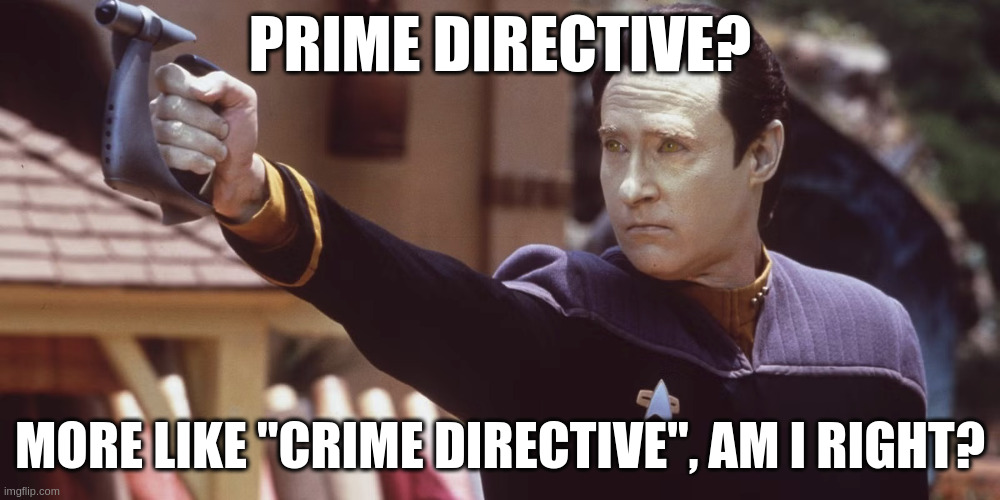
Best I could come up with. shrugs
Hot take: The prime directive is a paternalistic concept
Paternalistic implies the benefit to be on the recipient, but I see it more as self defense (for the benefit of both, but primarily the offerer), based on the premise that “nice” civilizations grow up to eventually gain technology, and they need the tempering of pain to help get them there. i.e. they need to lose their dependency upon magical thinking before they can be considered cultural equals.
Dead children cry out from a thousand worlds.
The prime directive is the most amoral thing in all of Star Trek.
If there are space faring aliens out there who have solved scarcity and they’re just watching the suffering that unfolds daily on this world - they better indeed hope we don’t figure out space travel because I will have serious unanswered questions.
(This same shit applies to all-powerful deities.)
A good counter example is vaccination.
Let’s say a benevolent alien ship passes by, and discovers a planet with a 90% child mortality rate, due to disease. They introduce vaccines to the population which drop it to under 10%. That’s great.
They return a few decades later, and the civilization is in shambles. It turned out that birth rates didn’t change much. The population started doubling every 5 years. Food production couldn’t keep up. The subsequent wars famine and civil unrest devastated the society.
We’ve seen similar problems, to a lesser extent, on earth. Providing cheap, second hand cloths to Africa ended up destroying the local textile industry. Many places are now dependent on that aid.
In star trek, Star fleet seems to do fly by visits to many places. They are not equipped to assess the results of interference. That would require a team onsite for long term study and assistance. You would need to improve multiple areas at once, each supporting the others. We see some evidence of this, in some episodes, though it is lacking.
The pre-warp limit also makes some sense. It’s an obvious marker for a society. By that point they have likely learnt the lessons with neive help internally. They can assess the risks, and introduce them carefully. They are also likely close enough in technology that the boost won’t destabilise their economy etc.
It’s far from perfect, but as a rule for fly by captains, it makes a good amount of sense.
This same shit applies to all-powerful deities.
There’s a pretty key difference between the Federation and a hypothetical tri-omni god. The Federation is not and cannot be omniscient. They might be, for all effective purposes, omnipotent, and we certainly like to think of them as highly benevolent. But we know, and they know, that they cannot foresee the longer-term consequences of action or inaction, in most cases.
My opinion is that when inaction would obviously doom an entire planet—such as if that planet is about to be catastrophically struck by a meteor—the Federation should intervene on a humanitarian basis. But nearly anything short of that and the Prime Directive is Good, Actually. In the case of intraplanetary conflict, asylum could be offered to victims of genocide or persecution, but contrary to @[email protected]’s statement, I think it is paternalistic to interfere because “you know better”. How many times have real-world powerful empires stepped in claiming to be doing good, only to end up causing very much the opposite result. Dozens of times in the last two centuries in the Middle East alone. There are people who will still try and claim that white colonists were good for Aboriginal people on the basis of this reasoning.
Malaria is a horrible disease - well worth doing something about. Plus, mosquitos are annoying:-P.
So when people gave Africans nets to put on the windows to their homes/bedrooms, the idea was that it would HELP.
Instead… Africans decided that they made pretty good nets for catching fish. However, the same extremely tiny holes that kept mosquitoes out of homes while they sleep also kept tiny little fish eggs in - very much unlike a traditional fishing net that would only catch the large fish while letting the eggs slip through back into the water where they could grow.
Entire lakes were devastated. The people, who did not know the consequences of merely trying to eat food to survive, destroyed the ability of future generations to likewise eat and survive.
It is hubris to think that we know what is best for some other culture that we have not met nor know much of anything about.
Edit: this is not to say that nothing should ever be done to help, only that care should be taken in doing so. e.g. selling guns to someone may sound like a good idea “for their protection”, but is it really? Whether I think so or not, Starfleet has decided to abide by that principle, and I think it is admirable. I presume that they know more about cultural development than I do, especially of pre- vs. post-warp societies:-).
I think it is paternalistic to interfere because “you know better”
I totally see where you are coming from but hear me out.
The first mention of the prime directive is a TOS episode which is an explicit allegory of the Vietnam War with federation and Klingon Empire supporting each side (they even mention it, not the name directly but something like "a war in south eastern Asia in the 20 century. Remember, this was during the war itself). This is a total valid critic of imperialism.
But interference isn’t always about coming with all the solutions and saying we know better. It can be about offering help on eye level, taking the other side serious.
Let’s take vaccination programs. It is paternalistic to roll out a program that produces results that suit you well and make you look good on paper (looking at you, Bill and Melinda Gates Foundation). It is not paternalistic to be in exchange with the locals to adjust to local needs and most and for most release the patents which didn’t happen with the covid vaccines due to the
prime directiveargument that only “we” know how to make vaccines safely. (I hope release is the right term, meaning making public domain)Edit: TL;DR: Prime Directive is a good concept in it’s first mention that was generalized in the wrong direction
The federation does trade and tries to help more primitive societies that they encounter. They provide medical supplies, food, and other things a society asks them for, but they won’t share technology or interfere with their politics because it always leads to massive harm. Putting their finger in the scale results in conflict, despotism, and weird religions around what the contacted people were exposed to.
Thanks for proving my point by using paternalistic language. So we have no moral obligations to civilizations with magical thinking because they aren’t our cultural equals but inferior? We can just watch them die and do nothing because they believe in zodiacs?
Besides: magical thinking isn’t even the criterion of the prime directive. It’s about warp technology. If it was about the scientific method, it would make a little more sense but even that’s independent of morality.
And what do you even mean with ““nice” civilizations”? So primitive/naive civilizations have to learn the hard way what technology can do to finally use the technology for good? We can’t give them vaccines before they had a world war? What has the one thing to do with the other? And how do you use words like “grow up” and claim it’s not paternalistic?
Paternalistic implies the benefit to be on the recipient
What does that even mean? I can paternalistically talk down to someone with no benefit or malefic to anyone except maybe an insult. I can control people paternalistically to my benefit and I can help and guide them for their benefit. Paternalistic doesn’t imply any benefit on any side. It’s about hierarchy, about feeling superior to people you don’t deem worthy to make decisions on their own or rather take their view serious and if anything, you confirmed my view that the prime directive is paternalistic.
The topic is the politics behind a fictional universe, no need for ad hominem attacks or for defending your views like you’re arguing for your client’s life in a court. Even Judge Q would ask you to simmer down.
This is the fallacy fallacy. Instead of engaging with anything I said, you acuse me of the ad hominem fallacy. No seriously, where do I attack the person? I attack their line of thinking and the terminology but if that’s ad hominem, what isn’t?
Also: if you can’t handle engaged arguments, maybe don’t use the internet, or maybe you should grow up. This is so typical for sh.itjust.works users.
I think Star Trek could argue either that they have no moral imperative to do ANYTHING at all, ever. Either that, or yes, leave them alone. I am not arguing for their sake, just saying that they can do as they please. If you want to invent warp speed travel, then so too could you:-).
I think Star Trek could argue either that they have no moral imperative to do ANYTHING at all, ever.
Well, Star Trek does argue that we have a moral imperative to do nothing and it’s wrong to help. I’m not saying they have to help each and everyone, I’m saying it’s paternalistic to never help. You either agree or disagree with me on that but I don’t quite get what this comment is doing on the agree/disagree binary/spectrum. Your first comment appeared to be on the disagree end.
If you want to invent warp speed travel, then so too could you:-).
I’m not sure what you mean. It reads like “it’s you’re fault that you die from a preventable illness we could cure in 5 minutes and that might take you a century to find a cure. If you really wanted help, you could just invent warp travel, not your fault you didn’t”
So there is another aspect of the Prime Directive that isn’t discussed as much, and that’s that it also exists not just in this paternalistic sense, but also as a reminder that we don’t always know what is right.
It’s best explored in the TNG episode “The Masterpiece Society” (S05E13). In short the Enterprise is tracking a star fragment and realizes that it’s path is going to cause harm to a nearby planet. They then discover an isolationist Human society lives on this planet. This society is isolationist because it’s been designed to be perfect, with no need for outside assistance. Begrudgingly they’re forced to admit that without the Enterprise’s help they’ll die.
Geordi has the most memorable line. After trying to find a solution and save the planet he chuckles and says, “Oh, that’s perfect. If the answer to all of this is in a VISOR created for a blind man who never would have existed in your society.”
The planet consisted of a society who thought they knew everything. They had perfectly designed a perfect society. If Star Fleet behaved this way, if the Prime Directive didn’t need to exist because Star Fleet always knew the correct answer, what would they get wrong?
In many cases Star Fleet captains don’t just let planets and societies die, they try to find a way to ensure they can continue to evolve and advance naturally. Yes, not interfering in some ways could be viewed as paternalistic. But there is another view, if we force our beliefs on another society, what do we lose? Now the reverse could also be true. If we don’t save a society, what do we lose? No matter what Star Fleet chooses to do or not do, there is a risk. So Star Fleet drew a line, warp technology. Technically the Vulcan’s drew the line, but it had sound logic and was adopted by Star Fleet.
But importantly it’s an understanding that we don’t know everything. It’s not an idea of superiority, it’s admittance someone or something out there might know more or be more advanced and to interfere would be a mistake.
I like that story because it shows how important it is to take as many perspectives into consideration as possible. True, we don’t know everything and I would argue, this isn’t about knowing more than others in a linear/hierarchical sense, but the whole knows more than the sum of its parts. It’s crucial to take the local perspective into consideration and the paternalistic aspect of the prime directive isn’t necessarily the conclusion itself but jumping to conclusion without involving the locals. This makes it more complex than it might sound since the locals aren’t a monolith. But every decision is paternalistic unless you are willing to really listen to those affected.
That’s an interesting theory, and it has been explored in science-fiction before. It’s basically the explanation for why the uplifting of the Krogan in Mass Effect was not normal and was in hindsight regarded as a bad idea.
But I feel like Star Trek’s messaging has been pretty consistent and clear on this. The Prime Directive exists because the Federation regards cultures’ ability to evolve on their own terms as sacrosanct.
My sort of writer’s room motivation head canon is that the Prime Directive was a symbolic politically motivated response to the irresponsible “uplifting of primitive civilizations” by major world powers that resulted in cargo cults and widespread death from disease and nuclear weapons testing throughout the cold war, the manifest destiny to expand ever westward and drive native populations from their lands, the concerted effort to deprive native populations of their food by hunting the buffalo of the Great plains to extinction. It’s also unfair to leave Hyper advanced technology in the hands of civilizations incapable of maintaining and repairing that technology.
Think if you brought a modern cell phone back in time even just 50 years, would someone from that time period would have the tools, supporting technology or the skills to make any repairs to that phone? I’m highly doubtful they could and that’s ignoring that there are so many other interlinking technologies that that cell phone is reliant on to function.
This leans into a critic, Picard Season 1 and Lower Decks tries to address: TOS and TNG have this Alien of the Week, First Contact attitude: I came, messed around, and left. Sure, given that “I don’t care about consequences” attitude, not messing too much is a good idea. But maybe the given is the problem and eye level relationship just works differently.
As far as TNG goes, a lot of the first contact stuff from S1 was a lot of already sufficiently advanced civilizations that are capable of at least local space travel and the Enterprise would openly announce like “Hey this is the Enterprise, we’re with the Federation, lets do diplomacy.” But whenever they interacted with less technologically advanced species they would usually do so much more covertly, wearing replicated disguises.
They’re more like guidelines than rules











